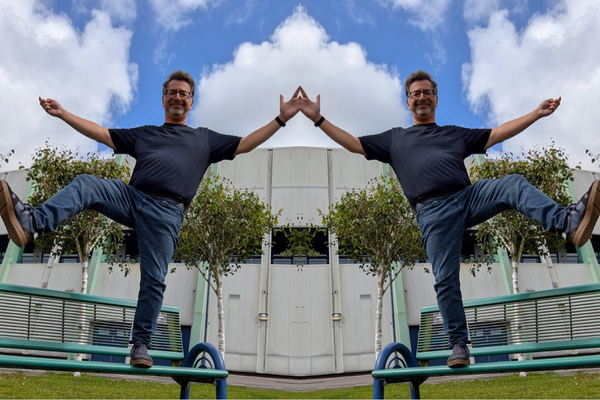
“Work-life balance” it’s a phrase we’re all familiar with, how’s yours going lately?
For many of us, balance is much more than just a buzzword, it’s a real priority. So much of a priority that, according to an international survey, work-life balance overtook pay as the top workplace motivator in 2025. No small shift! It suggests a deeper cultural change in how we view and find success and satisfaction in our professional lives.
While the idea of balance sounds ideal in theory, how often do we achieve it in managing both work and life? Do you know anyone who genuinely has and how would you know when you’ve reached it? Is it an achievable state, or simply an aspiration we chase and never quite grasp?
Some try to compartmentalise; work goes here, life goes there. Others break down their days into measurable blocks: work for ‘x’ hours, live for ‘y’. Some even go with a formula or percentages. When we try this in reality, it often feels like chasing an illusion. It doesn’t work that way, not consistently nor sustainably. So maybe it’s more about how we define and interpret “balance”.
Is there a better approach?
Perhaps a digital, binary idea of balance perfect halves, measured inputs and outputs isn’t what’s needed. Maybe an analogue approach offers something more meaningful.
One such helpful definition of work-life balance comes from Welch M. in How to Create a Healthy Work Balance (University of Salford, 2025) “It’s being able to divide your time and energy between professional responsibilities and personal wellbeing. A healthy work-life balance doesn’t mean a 50/50 split either. It means having the flexibility and support to manage both areas of your life without constant stress or sacrifice.”
This perspective offers a more fluid, realistic view. Balance isn’t about rigid time-splitting. It’s about feeling like you’re managing your responsibilities without losing yourself in the process.
Are you in balance or imbalanced?
When we’re in balance, we feel it! Signs such as increased energy, improved mood, better sleep and a general sense of fulfilment and control. Conversely, the signs of imbalance are just as powerful: poor sleep, low energy, brain fog, heightened stress which can eventually lead to burnout. It may be better and more practical to understand balance as a state of wellbeing.
A different perspective on balance?
In NLP (Neuro Linguistic Programming) we know and respect everyone operates with their own ‘model of the world’, our unique experiences and internal filters shape how we interpret and live life. That means balance will look and feel different for each of us.
Interestingly, imbalance isn’t always a negative. After major personal achievements or breakthroughs we may feel out of sorts. Why? Because we’ve outgrown a previous version of ourselves and moved forward leading to a change in identity. As our neurology changes with experience, it can take time to settle into a new identity causing a feeling of imbalance as we get to know our new version of self. So, in this case imbalance is (a necessary) part of growth.
We can also feel imbalance when experiencing internal conflict. In other words when part of us wants one thing, and another part wants something entirely different causing powerful inner turmoil. This state of conflict can impact upon our energy, confidence and clarity. Those around us may notice too often saying things like, “You don’t seem like yourself lately.” Parts and the internal conflict that they bring can last for years and when finally integrated brings a profound sense of release. We use a parts integration approach to achieve this, one of the most powerful techniques in NLP which students learn on Practitioner Training.
Instead of striving for a perfect balance, what if we focused on integration?

Moving beyond balance: The power of integration
Integration is about blending different parts of life so they work together rather than against each other. It’s about changing the perspective of work and life as separate parts to integrating both together into the whole by finding the same highest positive intention. As the mind values wholeness and the practice of NLP is to promote wholeness, this seems more relevant as an outcome.
In practice, integration might be experienced as:
- Being able to bring your values and passions into your work.
- Creating a working life that supports your personal growth.
- Acknowledging that you can be fully present as a parent, son, daughter, leader, or partner without needing to “switch hats” constantly.
- Allowing your personal life to inspire your work and vice versa.
Integration means designing a life where the lines between work and life are more fluid rather than blurred and in a way that feels intentional with purpose.
It’s about asking, “How can I build a life that reflects who I am in all areas, not just when I go to work and leave?”
When we shift our mindset from working within boundaries to that of wholeness, we can begin to view life not as something to balance, more as something to live fully with greater authenticity, alignment and harmony. In other words integrated. This may start as an aspiration and with investment in self development and personal growth, one that can be made realistic and personal to each of us.
Next steps
Balance is personal and can often be messy. It doesn’t mean unobtainable. By letting go of rigid expectations and embracing a more authentic, analogue perspective. Making a shift in mindset that respects the varied pace of life, we can start to experience a version of balance that feels good.
To go further by embracing a perspective of integration we can begin to think differently and reframe. Work and life aren’t opposing sides, they’re two parts of the same experience. When those parts are integrated with intention and self-awareness, the result is more than balance, it’s wholeness.
So instead of asking, “Have I got the right work life or life work balance?” perhaps a better question is:
“Does my life feel integrated, meaningful and true to who I am?”
If you want to make change and find out more about NLP you can subscribe to our regular communications, check out our latest training or events in your area.
New Perspective NLP is based in Bolton working with clients and organisations in Greater Manchester, Merseyside Cheshire and beyond.

